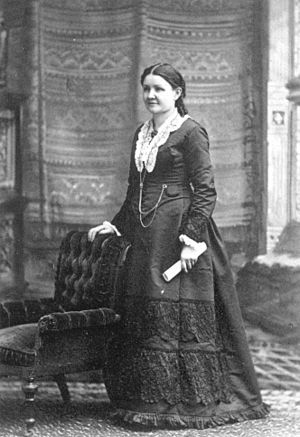Caroline Burnham Kilgore facts for kids
Caroline Burnham Kilgore (born January 20, 1838 – died June 29, 1909) was a very important person in American law. She was the first woman allowed to practice law in the state of Pennsylvania. This means she was the first woman lawyer in Philadelphia.
Caroline started studying law in 1875. At that time, it was very hard for women to get into universities. The dean of the University of Pennsylvania Law School even said he would quit if women were admitted. But Caroline kept trying for 16 years until she became a recognized lawyer.
Contents
Caroline's Early Life and Education
Caroline Burnham was born in Craftsbury, Vermont, in 1838. Her father, James Burnham, made woolen cloth. Her mother, Eliza Arnold Burnham, used to be a teacher. Sadly, Caroline became an orphan when she was only eleven years old.
To support herself, Caroline worked as a house helper. Later, she became a teacher. While teaching, she continued her own studies. She attended Craftsbury Academy and Newbury Seminary.
Caroline also taught in Wisconsin. After that, she decided to study medicine. She went to medical school at Hygeia-Therapeutic College. She earned her M.D. degree in 1865.
Breaking Barriers in Law
Caroline wanted to become a lawyer. In 1871, the University of Pennsylvania Law School turned down her application. She tried to buy tickets to attend individual lectures. Later, she sent her husband to buy the passes for her.
However, the school's leaders told her something unfair. They said even if she attended all classes and passed all exams, they would not give her a diploma. Despite this, Caroline studied law on her own.
She tried to take the bar exam in 1873 and 1874. The bar exam is a test you must pass to become a lawyer. But she was refused both times.
Caroline did not give up. After ten years of trying, she finally made history. In 1881, she became the first female student admitted to the University of Pennsylvania Law School. She graduated in 1883.
Caroline's Legal Achievements
Caroline Kilgore was allowed to practice law in important courts. In 1885, she could practice before the Supreme Court of Pennsylvania. This is the highest court in Pennsylvania.
Then, in 1890, she was allowed to practice before the Supreme Court of the United States. This is the highest court in the entire country.
Caroline was also a member of the Citizens' Suffrage Association. This group worked for women's right to vote. In 1871, she tried to vote in local elections. She was told she could not vote. She appealed this decision to the state supreme court, but they agreed with the original ruling.
She wrote a pamphlet about her argument. It was called Woman Suffrage. The Argument of Carrie S. Burnham. It showed her strong belief in women's rights.
Caroline Burnham Kilgore passed away in Swarthmore, Pennsylvania, on June 29, 1909. She was buried in Craftsbury Common Cemetery in Craftsbury, Vermont.
Caroline's Lasting Impact
Caroline Kilgore left an important legacy. In October 1965, the University of Pennsylvania honored her. They named Kilgore House after her. It is one of the buildings in the Robert C. Hill Residence Hall.
She is also recognized by the Philadelphia Bar Association. They list her as one of their "Legends of the Bar." This shows how important her contributions were to the legal field.
 | Isaac Myers |
 | D. Hamilton Jackson |
 | A. Philip Randolph |


